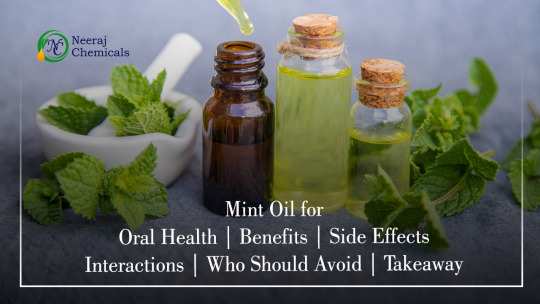#Pepermint
Explore tagged Tumblr posts
Text

they are married now
190 notes
·
View notes
Photo

Candy Cane Crunch Peppermint Cheesecake Cannoli
2K notes
·
View notes
Text
Mint Oil for Oral Health | Benefits | Side Effects | Interactions | Who Should Avoid | Takeaway

Mint oil, derived from the leaves of the mint plant, has been used for centuries for its refreshing flavour and medicinal properties. Today, it is widely recognized for its benefits in oral health, making it a popular ingredient in toothpaste, mouthwash, and other dental care products. However, like any natural remedy, mint oil has its benefits, side effects, and interactions that should be considered. This blog will explore the comprehensive aspects of using mint oil for oral health, focusing on its benefits, potential side effects, interactions with other substances, who should avoid it, and the key takeaways for its use.
Benefits of Mint Oil for Oral Health
Mint oil offers a range of benefits for oral health, making it a valuable addition to daily dental care routines. Here are some of the key advantages:
1. Freshens Breath
One of the most well-known benefits of mint oil is its ability to freshen breath. The strong, refreshing scent of mint oil can help mask bad breath and provide a clean, pleasant taste in the mouth. This is why mint oil is a common ingredient in toothpaste and mouthwash.
2. Antibacterial Properties
Mint oil has natural antibacterial properties, which can help reduce harmful bacteria in the mouth. These bacteria are often responsible for causing bad breath, plaque build-up, and gum disease. Regular use of products containing mint oil can help maintain a healthier oral environment by reducing the presence of these bacteria.
3. Reduces Inflammation
Mint oil’s anti-inflammatory properties can be beneficial for people suffering from gum inflammation, known as gingivitis. Applying diluted mint oil to the gums can help reduce swelling and discomfort, promoting overall gum health.
4. Supports Healthy Gums
In addition to reducing inflammation, mint oil can help strengthen the gums. Its antimicrobial properties prevent infections that could lead to gum disease, while its soothing effects help maintain gum health over time.
5. Soothes Toothaches
Mint oil has been traditionally used as a natural remedy for toothaches. The cooling effect of menthol, a major component of mint oil, can provide temporary relief from tooth pain by numbing the affected area.
6. Promotes Oral Hygiene
Incorporating mint oil into your daily oral hygiene routine can help prevent cavities and keep your teeth and gums healthy. Its antibacterial and anti-inflammatory properties work together to create a cleaner, healthier mouth.
Side Effects of Mint Oil
While mint oil offers numerous benefits for oral health, it is essential to be aware of potential side effects, especially when used improperly or in excessive amounts.
1. Irritation of Mouth and Gums
Mint oil is potent, and using it in undiluted form can cause irritation or a burning sensation in the mouth and gums. It’s important to dilute mint oil with a carrier oil (such as coconut or olive oil) before applying it to sensitive areas in the mouth.
2. Allergic Reactions
Some individuals may be allergic to mint oil. Symptoms of an allergic reaction can include itching, swelling, redness, or hives in the mouth or on the skin. If you experience any of these symptoms, discontinue use immediately and consult a healthcare professional.
3. Heartburn and Acid Reflux
Mint oil can relax the lower esophageal sphincter, which may lead to heartburn or acid reflux in some individuals. If you have a history of these conditions, it’s advisable to use mint oil with caution or avoid it altogether.
4. Dry Mouth
In some cases, mint oil can cause dry mouth, especially if used in large amounts. This can lead to discomfort and increase the risk of cavities and gum disease, as saliva is essential for maintaining oral health.
Interactions with Other Substances
Mint oil can interact with certain medications and substances, which may either diminish its effectiveness or cause unwanted side effects. Here are some interactions to be aware of:
1. Medications for Acid Reflux
As mentioned earlier, mint oil can relax the lower esophageal sphincter, potentially exacerbating symptoms of acid reflux. If you are taking medications for this condition, using mint oil might reduce their effectiveness or worsen your symptoms.
2. Homeopathic Remedies
Mint oil may interfere with the absorption or effectiveness of certain homeopathic remedies, particularly those that are menthol-sensitive. If you are using homeopathic treatments, consult your healthcare provider before incorporating mint oil into your regimen.
3. Iron Supplements
Mint oil can inhibit the absorption of iron in the digestive system. If you are taking iron supplements, it’s advisable to avoid using mint oil orally or ensure there is a sufficient time gap between using the oil and taking the supplement.
4. Herbal Supplements
Mint oil may interact with other herbal supplements, particularly those that affect digestion or circulation. If you are using herbal supplements, consult with a healthcare professional to ensure there are no adverse interactions.
Who Should Avoid Mint Oil?
While mint oil can be beneficial for many, certain individuals should avoid its use or use it with caution.
1. Pregnant or Breastfeeding Women
Pregnant or breastfeeding women should use mint oil cautiously, as its effects during pregnancy and lactation are not well-studied. It’s best to consult a healthcare provider before using mint oil during these periods.
2. Infants and Young Children
Mint oil should not be used on infants or young children, as it can cause severe respiratory issues, including breathing difficulties. The strong scent and potency of mint oil can be overwhelming for a child’s delicate respiratory system.
3. Individuals with Gastroesophageal Reflux Disease (GERD)
People with GERD or chronic acid reflux should avoid mint oil, as it can relax the lower esophageal sphincter and worsen symptoms. If you experience frequent heartburn, it’s best to avoid using mint oil internally.
4. Those with Mint Allergies
Individuals who are allergic to mint or menthol should avoid mint oil entirely to prevent allergic reactions. Even topical use of diluted mint oil can trigger symptoms in those with sensitivities.
Takeaway
Mint oil is a powerful natural remedy that offers numerous benefits for oral health, from freshening breath to supporting healthy gums. However, like any essential oil, it’s important to use it with care and be aware of potential side effects and interactions. Whether you’re adding mint oil to your daily oral care routine or using it as a targeted treatment, ensuring you source high-quality oil is key.
For those seeking trusted mint oil wholesalers in India, Neeraj Chemical is a name that stands out. With a commitment to quality and ethical sourcing, Neeraj Chemical provides pure and effective mint oil that can enhance your oral health regimen. By incorporating mint oil thoughtfully and with awareness of its potential effects, you can enjoy its many benefits while maintaining a healthy and vibrant smile.
2 notes
·
View notes
Text

Chocolate Peppermint Patties
#nanci's bake shoppe#food#delicious#yumyum#delish#sweet#foodpics#pepermint#chocolate mint#peppermint patties#sweet snacks#indulgeyourself
23 notes
·
View notes
Text

1950 Life Savers Stik-O-Pep candy
#1950#stikopep#candy#life savers#pepermint#cerealkiller#vintage food#food#vintage advertising#vintage magazine#kitchen#magazine#1950s#50s#50s ads
35 notes
·
View notes
Text

27 notes
·
View notes
Text




#cookie run kingdom#cookie run#icons#crk icons#crk#cr icons#cr#crob icons#crob#cr ob#cr ob icons#sorbet icons#pepermint icons#sorbet shark cookie#sorbet shark my beloved#sorbet#sorbet shark#sorbet and pepermint#pepermint cookie run#pepermint#pepermint cookie#cookie run icons#cookie run ovenbreak#cookie run ob#cookie run kingdom icons#cookie run ovenbreak icons
7 notes
·
View notes
Text

This is amazing ngl
0 notes
Text




turquoise G1 transparents
#sweet tooth#pepermint crunch#fancy flower#peach blossom#mlp#mlp g1#my little pony generation 1#my little pony gen 1#my little pony g1#assets#asset#my asset#transparent#sticker
26 notes
·
View notes
Text

like whats up yuri
29 notes
·
View notes
Text

5 notes
·
View notes
Text
as everyone else finishes their pre-fionna-and-cake rewatches here’s my two cents: you SHOULD watch wizard city LAST because it’s best watched through the together again tears
#yeah yeah yeah together again is the last episode. I know. but you need something stupid to lighten up after that#and what better way than to (squints at writing on hand) watch pepermint butler torment his child self until that kid kills several adults#it hits different after together again. it’s such a whiplash. it’s delightful. that’s how it’s meant to be experienced#while you’re so sad and raw cuz finn and jake are together again🥺🥺🥺🥺🥺🥺🥺🥺😭😭😭 and then it’s like Hullo! I’m Song Wizard;)#meanwhile you’re still hugging your knees like ok song wizard 🥺 I just got my soul ripped out can u help maybe this episode will fix me#it won’t#it will only confuse you but hey it’s pretty#atimers#<- goes there. usually I’m scared to tag things as that. but this can go in that tag hi#adventure time#not art#like when you just watch it separate it’s Different. it’s Not the Same. but in the release/dvd order? after together again ? AUGH#special#this was gonna go on main and everything but I got shy
20 notes
·
View notes
Text
How Peppermint Oil Suppliers in India Are Supporting Wellness Trends

In today’s fast-paced world, where wellness is becoming a priority for individuals and industries alike, essential oils like peppermint oil are seeing a significant surge in demand. Known for its refreshing aroma, therapeutic properties, and versatility, peppermint oil has become a staple in aromatherapy, skincare, and healthcare products. Among the global players, Peppermint Oil Suppliers in India have carved out a unique niche, contributing significantly to the wellness movement.
This blog delves into how these suppliers are addressing the rising trends in wellness, emphasizing sustainability, quality, and innovation to meet global demands.
The Role of Peppermint Oil in Wellness Trends
Peppermint oil is celebrated for its natural properties that cater to a variety of wellness needs:
Aromatherapy: Its calming and cooling aroma helps alleviate stress, anxiety, and mental fatigue, making it a favorite in wellness spas and relaxation therapies.
Health Benefits: Known for its potential to ease digestive issues, relieve headaches, and improve respiratory health, peppermint oil is a popular choice for natural remedies.
Personal Care: Widely used in products like shampoos, toothpaste, and skincare items, peppermint oil offers cooling and antimicrobial benefits, which enhance personal care routines.
These diverse applications make peppermint oil a cornerstone of modern wellness trends, further fueling the demand for reliable suppliers.
Why India Is a Hub for Peppermint Oil Supply
India has a rich history of cultivating medicinal plants and producing essential oils, including peppermint oil. Several factors contribute to the prominence of Peppermint Oil Suppliers in India on the global stage:
1. Abundance of Raw Materials
India’s favorable climate and fertile soil are ideal for growing peppermint plants. This ensures a consistent and sustainable supply of high-quality raw materials, making it possible to produce pure and potent peppermint oil.
2. Expertise and Experience
India has a long-standing tradition of essential oil production. Suppliers leverage decades of experience and technical expertise to extract peppermint oil using advanced methods like steam distillation, ensuring its purity and therapeutic efficacy.
3. Focus on Quality
Indian suppliers are known for adhering to international standards of quality. Many offer certifications such as ISO, GMP, and USDA Organic, which demonstrate their commitment to delivering premium products.
4. Cost-Effectiveness
India’s efficient production processes and relatively lower costs allow suppliers to offer high-quality peppermint oil at competitive prices. This combination of affordability and quality has positioned Indian suppliers as global leaders.
5. Sustainability Practices
With growing awareness of environmental issues, many Indian suppliers are adopting sustainable farming and production practices. This not only supports the wellness movement but also aligns with the values of environmentally conscious consumers.
The Connection Between Indian Suppliers and Global Wellness Trends
The rising global interest in natural and organic products has been a driving force behind the success of Peppermint Oil Suppliers in India. Here’s how they are contributing to the evolving landscape of wellness:
1. Supplying to Diverse Industries
Indian suppliers cater to various sectors, including:
Aromatherapy: Providing pure peppermint oil for relaxation and stress relief therapies.
Cosmetics: Meeting the demand for natural ingredients in personal care products.
Food and Beverage: Offering food-grade peppermint oil for flavoring.
Pharmaceuticals: Supplying peppermint oil for its therapeutic properties.
2. Meeting Global Standards
With stringent quality control measures, Indian suppliers ensure their products meet the expectations of international buyers. From the extraction process to packaging, every step is designed to preserve the oil’s integrity.
3. Supporting Innovation
Indian suppliers are continually innovating, offering custom blends and specialized formulations to meet specific needs. This ability to adapt has made them indispensable partners in the wellness industry.
Challenges Faced by Peppermint Oil Suppliers in India
Despite their many strengths, Indian suppliers face challenges such as fluctuating demand, climate variability, and competition from other markets. However, their resilience and adaptability have enabled them to overcome these obstacles. Here’s how:
Investing in Research and Development: Suppliers are focusing on R&D to improve extraction techniques, enhance product quality, and develop innovative applications for peppermint oil.
Sustainable Practices: By promoting organic farming and eco-friendly production methods, suppliers are mitigating the impact of environmental challenges.
Strengthening Relationships: Indian suppliers build long-term relationships with international buyers by ensuring consistent quality and timely delivery.
How to Choose the Right Peppermint Oil Supplier in India
Selecting the right supplier is crucial for businesses looking to incorporate peppermint oil into their products. Here are some factors to consider:
1. Certifications
Look for suppliers who provide certifications like ISO, GMP, or USDA Organic, which indicate adherence to international quality standards.
2. Transparency
A reliable supplier will be transparent about their sourcing, production methods, and product composition. This ensures you’re receiving a high-quality, authentic product.
3. Flexibility
Choose a supplier who can accommodate your specific needs, whether it’s custom blends, bulk orders, or specialized packaging.
4. Customer Feedback
Check reviews or testimonials to understand the supplier’s reliability and reputation in the market.
5. Sustainability Practices
Opt for suppliers who prioritize sustainable practices, aligning with the values of modern wellness consumers.
The Future of Peppermint Oil Suppliers in India
As the demand for natural and organic products continues to rise, the role of Peppermint Oil Suppliers in India will only grow more significant. With a focus on innovation, quality, and sustainability, these suppliers are well-positioned to meet the evolving needs of the global wellness industry.
Technological advancements and increased investment in R&D are likely to further enhance their capabilities. From advanced extraction techniques to eco-friendly packaging solutions, Indian suppliers are leading the way in adapting to market trends.
Conclusion
The wellness movement has ushered in a new era of demand for natural and effective products, with peppermint oil playing a pivotal role. Peppermint Oil Suppliers in India have emerged as leaders in this space, offering high-quality, sustainable solutions that cater to diverse industries and applications.
Their expertise, commitment to quality, and alignment with global wellness trends make Indian suppliers indispensable partners for businesses worldwide. Among these suppliers, Neeraj Chemicals exemplifies the strengths of the Indian essential oil industry. By choosing a reliable supplier like Neeraj Chemicals, businesses can ensure they’re contributing to the wellness movement while delivering exceptional products to their customers.
0 notes
Text
youtube
#food#delicious#yumyum#delish#baking#bakinglove#bakinglife#sweet#tasty recipes#macaroons#coconut#pepermint#tasty food#try it#Youtube
0 notes
Text

Avon Cinnamon Twist Bubble Bath
Holiday 2006
Found on Ebay, user Hondalg
#avon#vintage avon#vintage avon bubble bath#avon cinnamon twist bubble bath#avon holiday 2006#2000s holiday#2000s avon christmas#2000s avon bubble bath#avon cinnamon twist#cinnamon twist bubble bath#2000s christmas avon#2000s bubble bath#cinnamon#2000s nostalgia#cinnamon and pepermint#pepermint bubble bath
2 notes
·
View notes
Text
I'm very bad at eating pepermints
I shrimply cronch that thang
5 notes
·
View notes